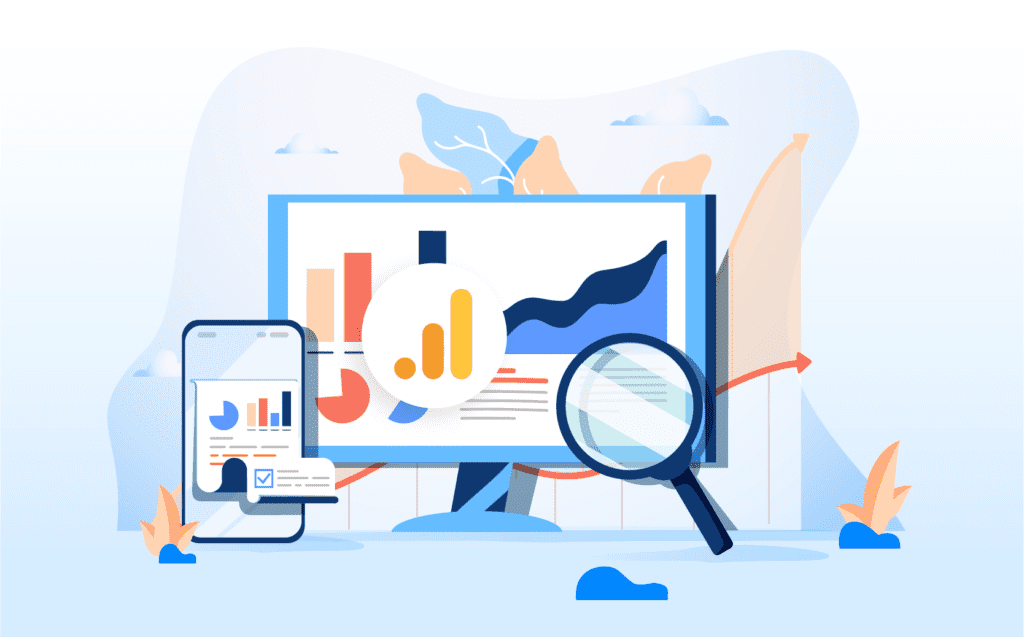We’re pleased to announce the launch of the Google Analytics 4 demo properties!
These properties provide realistic analytics data from an Ecommerce store and a gaming app, and are now available through the public Google Analytics Demo Account.
As a Google Analytics educator, the Google Analytics Universal demo account for the Google Merchandise Store has been an invaluable resource and my go-to for countless training sessions. The launch of GA4 demo properties is an exciting next step toward adoption of the next evolution in analytics.
Access the Google Analytics 4 Demo Properties
If you have previously had access to the public Demo Account that houses the Google Merchandise Store property for Google Universal Analytics, you should now also have access to the Google Merchandise Store and Flood It! properties for GA4 within that same account.
If you do not currently have access to the Demo Account, see Demo Account in the Google help docs.
The Merchandise Store property provides a web stream with standard reporting including:
- Ecommerce w/internal promotions, coupon codes, etc.
- Marketing data / Google Ads data
- Events & user properties.
The Flood-It! property provides Android, iOS and web streams for games reporting including: gaming events, conversions, user properties and audiences
Now accessible to anyone with a Google account, the demo properties are a great way to learn Google Analytics 4. Highlighted below are several aspects of the demo properties that you can check out to start gaining practical experience with the next generation of Google Analytics.
Account Structure
A fundamental change to the account structure in Google Analytics 4 is that you won’t find a view level when you’re looking at the admin screen (or anywhere else).
Some of the functionality for views in GA Universal – namely, subsetting your data based on technology, acquisition, or geographical dimension values – has been taken up by Audiences in GA4.
The Google Analytics 4 account structure goes down to the property level. GA4 does not have a direct equivalent of GA Universal views.
Report Templates: Funnel Analysis
The templates for advanced analysis are among the most significant features in Google Analytics 4. In Google Universal Analytics, this capability is available only in the enterprise version of the platform. GA4 opens these up to everyone to further explore data and drill down for deeper insights.
You can access the reporting templates by clicking Analysis > Analysis Hub in the left navigation. Several analyses, including Checkout Behavior Funnel, are already shared in the Google Merchandise Store property.
Several analyses are already created and shared in the Google Merchandise Store property.
All Google Analytics 4 users can create dynamic, retroactive funnel visualizations.
In the Funnel reports, you can now also switch to Trended Funnel as the visualization to demonstrate flow and drop off between the funnel steps over time.
The Trended Funnel Report demonstrates flow and dropoff between funnel steps over time.
Report Templates: Path Analysis
Once you have viewed some of the shared analyses, you’ll definitely want to create some of your own and take advantage of the different report and chart formats available, such as Path Analysis.
The new Path Analysis format shows the flow of user interactions in terms of pageviews or all events. Clicking Start Over allows you to configure an Ending Point Path Analysis.
The new Ending Point Path Analysis format allows you to map the flow of interactions to a specific ending point.
Report Templates: Line Chart (with Anomaly Detection)
The Line Chart format that you apply in the Exploration template surfaces machine-learning-detected anomalies that may warrant special attention.
The Line Chart format highlights detected anomalies.
Enhanced Search
The search feature in GA4 returns a variety of results, including insights, built-in reports, and help articles.
You can enter a query in the main search field.
The search feature suggests Insights, built-in reports, and help articles.
Insights
Google Analytics 4 leverages machine learning to deliver more meaningful insights so you can gain a more complete understanding of how customers interact with your business and improve ROI on marketing efforts and app/web development.
You can access dynamic, ML-supported insights from the Home panel in GA4.
Audiences
Audiences allow you to subset your data based on user behavior and characteristics. They serve a purpose comparable to views (and custom segments) in GA Universal.
Audiences defined in the GA4 Merchandise Store property.
Audiences defined in the GA4 Flood It! property.
You can drill down into these audiences directly, or you can use them in Comparisons (described below) or custom reports.
Since Edit access to the property is required for creating an Audience, you won’t be able to create your own in the demo properties. But once you create and track within your own properties, you can create audiences that correspond to different user segments and extend your analysis.
Comparisons
Most of the essential reporting functionalities that we know from Google Universal Analytics are also available in GA4, but may have a different name and a different look and feel. The Customize Report option that is available in many GA4 reports allows you define Comparisons, which correspond fairly closely to custom segments in Universal.
You can define Comparisons for a wide range of dimension values, including Audiences that are already defined in the property. Comparisons can be applied dynamically by all GA4 users; edit access to the property is not required.
The Comparison feature in GA4 is similar to Custom Segments in Universal.
Custom Dimensions
Events and event parameters provide the foundation for the Google Analytics 4 schema. For event parameters to be available in many GA4 reporting contexts – such as the Exploration Analysis below – they need to be mapped as a Custom Dimension (or a Custom Metric) by a GA4 user with Edit access.
One such Custom Dimension in the Google Merchandise Store property is promotion_name.
Event parameters that have been mapped as Custom Dimensions are available in many GA4 reporting contexts.
Ecommerce Reports
In Google Analytics Universal, implementation for Enhanced Ecommerce reporting is very different from other types of pageview and event tracking. Ecommerce tracking in GA4 adheres to the fundamental event and parameter model, but GA4 still does provide specialized metrics and reporting for Ecommerce.
The Ecommerce reports in GA4 are based on the ecommerce events and parameters that are recorded.
Automatically Collected Events
Google Analytics 4 automatically collects a range of events when implemented for mobile apps and/or web. The All Events report displays these events and associated parameters alongside custom events that your implementation team has recorded…or the Flood It! implementation team in this case.
Automatically collected GA4 events appear alongside custom events.
Reporting Sets
Multiple Data Streams
The unified data model for Android, iOS, and web data streams serves as a foundation of Google Analytics 4. Navigate to Tech > Overview to view the percentage of users recorded in each data stream.
GA4 Demo Properties as Data Sources in Data Studio
Once you have gained access to the GA4 demo properties, they also become available as data sources in Data Studio for additional visualization and exploration options.
You can also use the GA4 demo properties as data sources in Data Studio.
We’ve covered just a few aspects of the Google Analytics 4 dataset and reporting UI. Now it’s your turn to navigate the GA4 demo properties and start building new reporting proficiencies.
We recommend implementing Universal/GA dual tracking on your website and linking your Firebase projects to a GA4 property so you can apply your learnings and gain next-generation insights for your organization.
Additional Resources
Introducing the New Google Analytics (Google Marketing Platform blog)
Meet the Next Generation of Google Analytics (Google doc)
Discover the Next Generation of Google Analytics (Skillshop course)
GA4: What CTOs Need to Know (Cardinal Path blog)
Comparing Universal to GA4: 15 Key Differences to Know (Cardinal Path blog)
googleanalyticstest.com (Cardinal Path learning resource for Universal and GA)


















